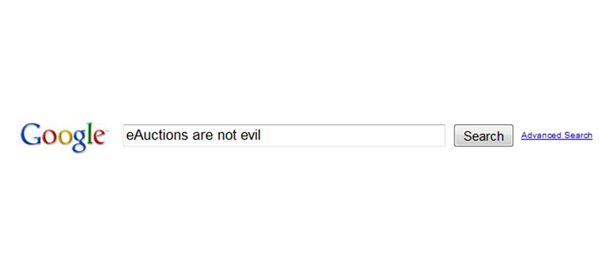Hypothesis: eAuctions (and eSourcing) are not evil.
Proof:
I. Google’s Code of Conduct states in its Preface: “Don’t be evil.” Googlers generally apply those words to how we serve our users. But “Don’t be evil” is much more than that. Yes, it’s about providing our users unbiased access to information, focusing on their needs and giving them the best products and services that we can. But it’s also about doing the right thing more generally — following the law, acting honorably and treating each other with respect.
II. Google expects “all of our employees and Board members to know and follow the Code.”
III. David Natoff and Dr. Bernd Huber run eAuctions
IV. David Natoff and Dr. Bernd Huber are Googlers
V. Therefore, eAuctions are not evil
Hypothesis proven//
The conditional logic used to prove my hypothesis above was developed from my notes taken during an interactive two-hour workshop given by David Natoff, Google’s Head of Global Supplier Sourcing and Dr. Bernd Huber, Google’s Head of Global e-Sourcing Center of Excellence entitled “eSourcing Best Practice: The Google Experience” at the NAPP conference earlier this month.
David and Bernd’s workshop was engaging and refreshing, as is their approach to eAuctions. To start, unlike most sourcing professionals, the team does not shy away from the use of the term “auction”, and in fact, uses the terms “eAuctions” and “eSourcing” interchangeably to refer to all types of online negotiations. I find this refreshing because I have always considered “eSource” and “eAuction” to be synonyms that mean “to conduct an online competitive bidding event,” and, not references to the wide range of business rules and visibility that can be applied to an online negotiation (I’ll revisit this discussion in many future articles).
Even more bold and refreshing is their powerful doctrine, which is as David simply puts it, “If you can specify it, you can auction it. And if you can’t specify it, what the hell are you doing working on it?” David’s explanation is a deviation on the eSourcing Manifesto I published in a 2009 research report[i] (which I have since re-crafted and re-dubbed as “eSourcing 2.0”) and a core operating premise or principle that I believe all CPOs should enact.
David began by walking the audience through the evolution of the sourcing and procurement operations at Google. With almost every young, high-growth company, procurement is an afterthought – having the server, office chair, etc. there when it’s needed is much more important that the price that is paid. Google was no different, but after joining Google three years ago, David and his team have sought to develop and enact a series of policies and processes that that a high-charging, global enterprise can leverage to great result. One example of their success is the 99% compliance to its “No-PO, No Pay” policy. Another example of their success is the eSourcing Center of Excellence (“CoE”), headed by Dr. Bernd Gruber, who may be world’s tallest eSourcing expert.
Bernd and David then talked about the development and operations of the eSourcing CoE including the development of a team of global resources with a set of tools and processes matched with a plan to engage stakeholders. They also talked about the categories that they have sourced since January 2009 when they deployed a SynerTrade eSourcing solution and the hundreds of millions in savings that they have attained. The team believes that the best way to drive adoption is to (1) gain senior leadership sponsorship, (2) hire and train the right people, and (3) utilize internal, centralized eSourcing support. Marketing also plays a big role in adoption as the team showed us a self-produced video that highlighted success stories from different internal constituencies and also talked about showing live auctions on the TVs in lunchrooms around the globe.
The Googlers then placed the audience into bidder teams and had it participate in an interactive, live “mock” auction on the SynerTrade platform that they use for all sourcing activity and discussed their approach to supplier training as well as the overarching policies and practices that are followed in every event.
Two years in, the Google team has great momentum and will need much more as it seeks to ultimately have 80% of its supplier spend competitively bid on a two-year cycle. I believe that this team has more than “proven” that the broad application of eAuctions (or eSourcing) to the negotiation process can drive great business value. //
Postscript I: If there is any debate in your mind that Google is one of the best places to work, you can put it to rest. During the presentation David mentioned eAuctioning the annual “employee food/cafeteria” spend @ Googleplex and shared some figures. Let me just say that “eat like a Googler” may soon supplant “eat like a King” in our vernacular.
Postscript II: Over dinner, the guys also shared the “beer” spend for (and level of participation in) Google’s Friday Night beer parties which happen at their offices around the world. Bill Dempsey would be thrilled.
[i] Search “CPO’s Agenda 2009: Smart Strategies for Tough Times” and you will be able to find links to free copies of this report.

